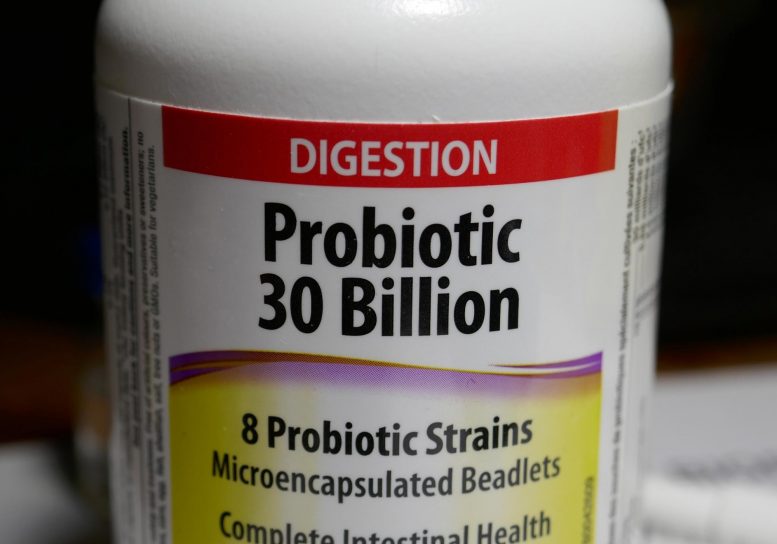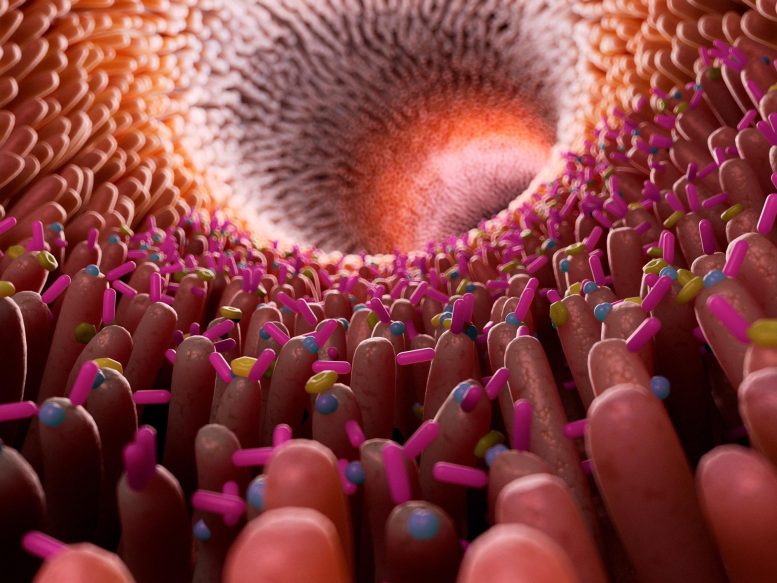
In a recent study, a research team from the University of Basel and the University Psychiatric Clinics Basel (UPK) has shown that probiotics can support treatment with antidepressants.
Good Bacteria To Tackle Depression
Gut microbiome plays an important role in health – including mental health. Researchers from the University of Basel and the University Psychiatric Clinics Basel (UPK) have shown that probiotics can support the effect of antidepressants and help to alleviate depression.
In modern society, depression is a pretty widespread problem. In fact, according to the CDC, 18.5% of adults surveyed in 2019 in the United States had symptoms of depression that were either mild, moderate, or severe in the previous 2 weeks.
What may come as a surprise to many is that scientists have just found that your intestinal flora, the trillions of bacteria and other microbes that live in your digestive tract, can affect depression. Yet this isn’t as strange as it sounds, as your gut microbiome is known to play a significant role in health and may have links to weight loss, autism, COVID-19 severity, ALS, and drug safety and efficacy.
When he was visited by what he called “the black dog,” Winston Churchill could barely get out of bed. He had no energy, no interests, and no appetite. Although the British prime minister didn’t invent this metaphor for depression, he was the one who popularized it.
Experts use medication and psychotherapy to try to help patients escape from the “black dog,” but it persists in some individuals. Researchers are therefore searching for ways to improve existing therapies and develop new ones.
One promising approach is the microbiome-gut-brain axis. The microbiome is generally understood to mean all the microorganisms that live in or on the human body, such as the intestinal flora. Intestinal bacteria can influence the nervous system for instance via metabolic products.
In a recent study, a research team from the University of Basel and the University Psychiatric Clinics Basel (UPK) has shown that probiotics can support treatment with antidepressants. They reported their findings on June 3, 2022, in the journal Translational Psychiatry.

Illustration of the human gut microbiome.
Intestinal flora influences the psyche
It is known from previous studies that patients with depression show an above-average prevalence of intestinal and digestive problems. If the intestinal flora of people with depression is implanted in mice raised in sterile conditions – that is, with no intestinal flora – then the animals also develop depressive-like behavior. For example, they are less energetic and show decreased interest in their surroundings than their peers. Researchers therefore suspect that the composition of the bacterial community in the gut plays an important role in depressive symptoms.
“With additional knowledge of the specific effect of certain bacteria, it may be possible to optimize the selection of bacteria and to use the best mix in order to support treatment for depression.” — Anna-Chiara Schaub
In their new study, the researchers led by Dr. André Schmidt and Professor Undine Lang systematically investigated the effects of probiotics on patients with depression. All participants were inpatients at the University Psychiatric Clinics Basel (UPK) and were given a probiotic (21 subjects) or a placebo (26 subjects) for 31 days, in addition to antidepressants. Neither the participants nor the study staff knew which preparation the subjects were taking throughout the study period. The researchers carried out a series of tests on the participants immediately before treatment, at the end of the 31 days, and again four weeks later.
The subsequent analysis showed that although depressive symptoms decreased in all participants thanks to the general antidepressant treatment, there was a greater improvement in the subjects in the probiotic group than in the placebo group.
In addition, the composition of their intestinal flora changed, at least temporarily: in the probiotic group, an analysis of stool samples revealed an increase in lactic acid bacteria at the end of treatment – an effect that was accompanied by a reduction in depressive symptoms. However, the level of these health-promoting gut bacteria decreased again over the following four weeks. “It may be that four weeks of treatment is not long enough and that it takes longer for the new composition of the intestinal flora to stabilize,” explains Anna-Chiara Schaub, one of the lead authors of the study.
Change in the processing of emotional stimuli
Another interesting effect of taking probiotics was seen in relation to brain activity when viewing neutral or fearful faces. The researchers investigated this effect using functional magnetic resonance imaging (fMRI). In patients with depression, certain brain regions for emotional processing behave differently than in individuals with good mental health. After four weeks of probiotics, this brain activity normalized in the probiotic group but not in the placebo group.
“Although the microbiome-gut-brain axis has been the subject of research for a number of years, the exact mechanisms are yet to be fully clarified,” says Schaub. This was another reason why the researchers believed it was important to use a wide range of bacteria in the form of probiotics, such as formulations already available on the market. “With additional knowledge of the specific effect of certain bacteria, it may be possible to optimize the selection of bacteria and to use the best mix in order to support treatment for depression,” says the researcher – although she is keen to emphasize that probiotics are not suitable as a sole treatment for depression.
Reference: “Clinical, gut microbial and neural effects of a probiotic add-on therapy in depressed patients: a randomized controlled trial” by Anna-Chiara Schaub, Else Schneider, Jorge F. Vazquez-Castellanos, Nina Schweinfurth, Cedric Kettelhack, Jessica P. K. Doll, Gulnara Yamanbaeva, Laura Mählmann, Serge Brand, Christoph Beglinger, Stefan Borgwardt, Jeroen Raes, André Schmidt and Undine E. Lang, 3 June 2022, Translational Psychiatry.
DOI: 10.1038/s41398-022-01977-z









I would like to get the probiotics plz
What’s the best probiotic to purchase?
In reply to both other comments, that’s not how this works. Don’t just take pills SciTechDaily mentions. The article references a study. Read the whole study as it’s freely available. Science also requires rigour with other replicated studies to strengthen or falsify a finding. Studies conflict, and you’ve gotta be careful with your health. That’s why you’ll see articles like “Bacon Causes Obesity”, “Bacon Prevents Obesity”, and “Miraculous Bacon Diet”. All that said, depression sucks, and it’s hard to be Miss Science when depressed, so I checked and it’s a broad spectrum of probiotics that you can get in any combo probiotic. The study only noticed a small but significant difference in self-reported depression scores, and it also noticed a decrease in bacteroides bacteria which happens with obesity in another study, plus it’s an very short duration study with a very small sample size.
All that being said, the probiotic is generally regarded as safe, so have at it:
“Patients took a probiotic supplement (Vivomixx, Mendes SA, Lugano, Switzerland) containing eight different strains (Streptococcus thermophilus NCIMB 30438, Bifidobacterium breve NCIMB 30441, Bifidobacterium longum NCIMB 30435 (Re-classified as B. lactis), Bifidobacterium infantis NCIMB 30436 (Re-classified as B. lactis), Lactobacillus acidophilus NCIMB 30442, Lactobacillus plantarum NCIMB 30437, Lactobacillus paracasei NCIMB 30439, Lactobacillus delbrueckii subsp. Bulgaricus NCIMB 30440 (Re-classified as L. helveticus))”. Lots of non-Vivomixx probiotics have the same or similar mix of strains. Research what’s available, what the strains do in studies, and pick what’s hopefully best for you. Do not use if you have a weakened immune system, if allergic to any of the strains of bacteria, or while under heavy machinery or planning to become under heavy machinery. Don’t bother asking your doctor if Bacteria® are right for you.